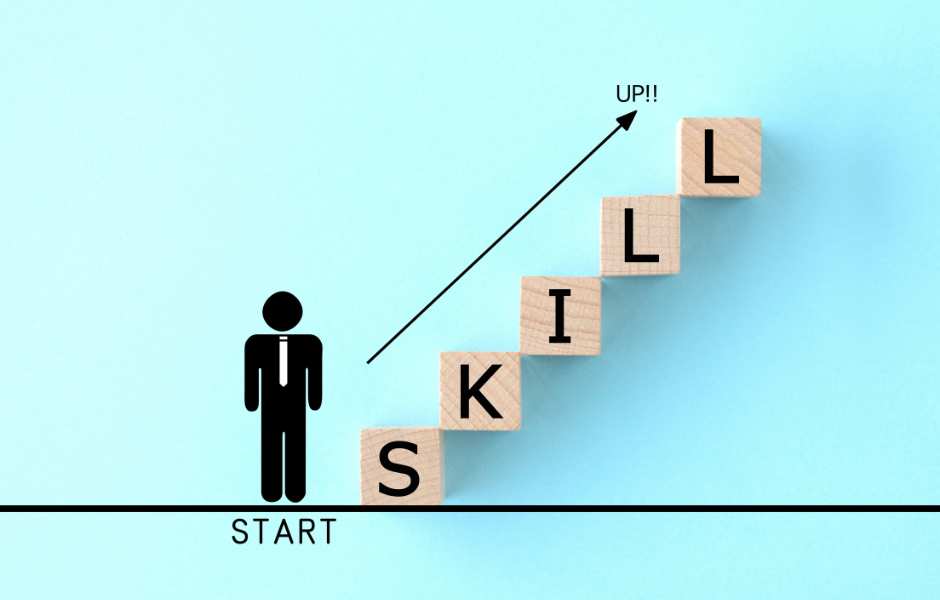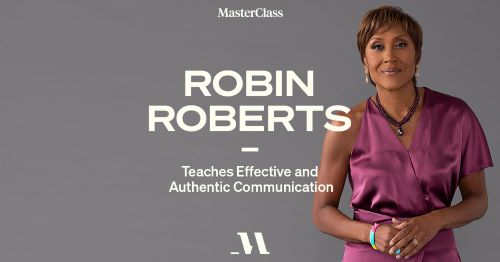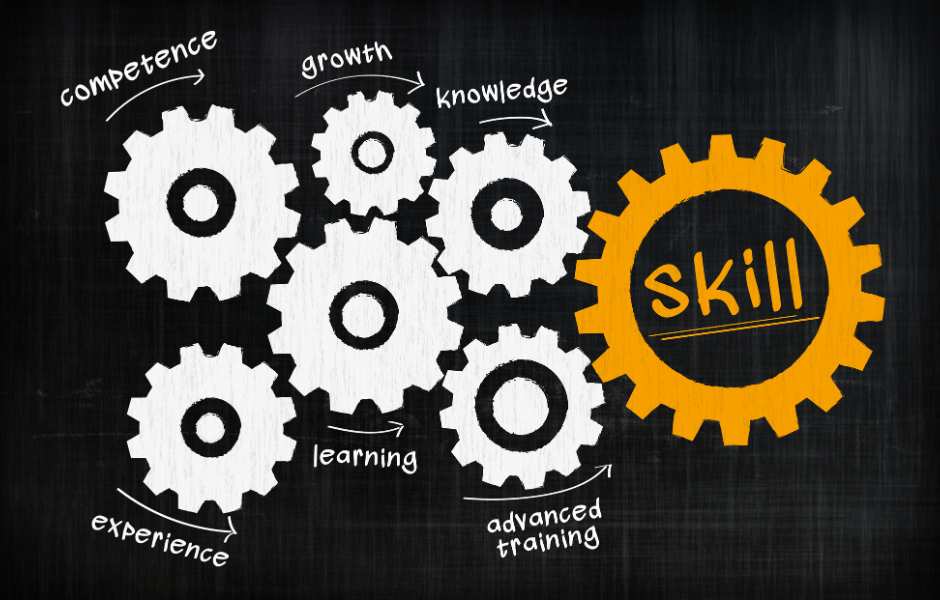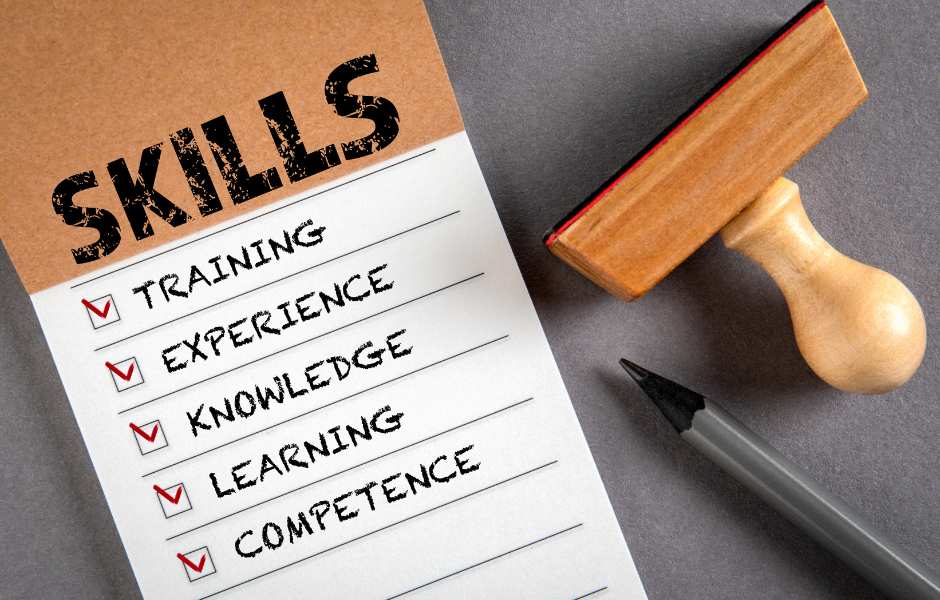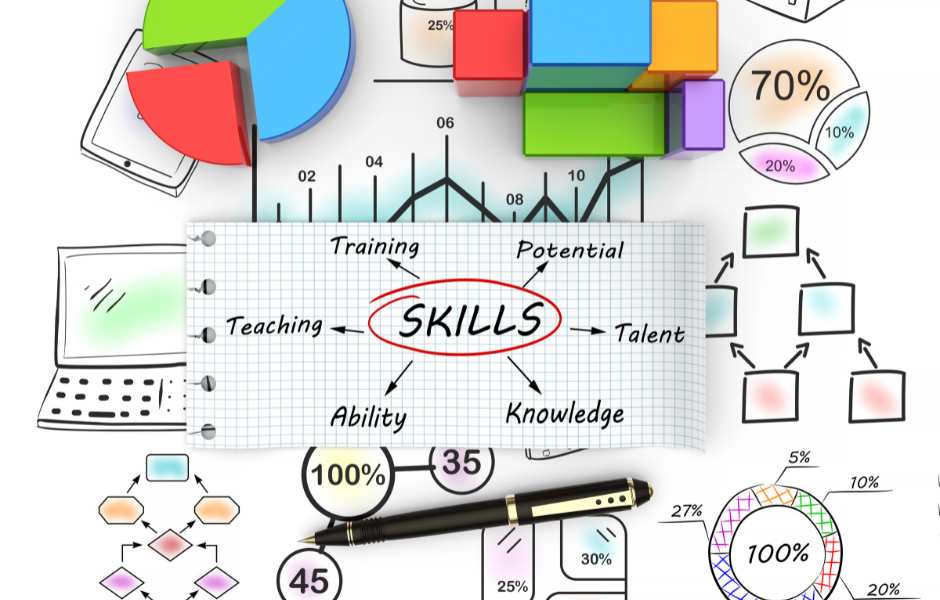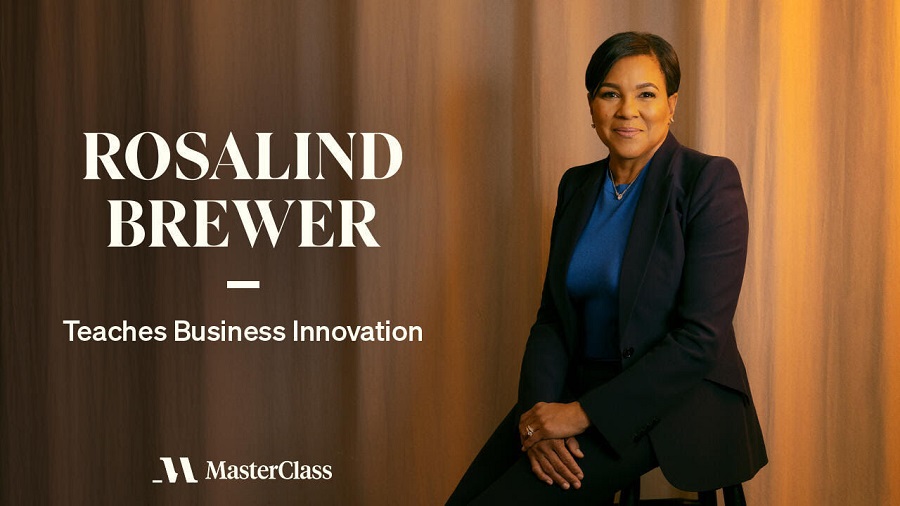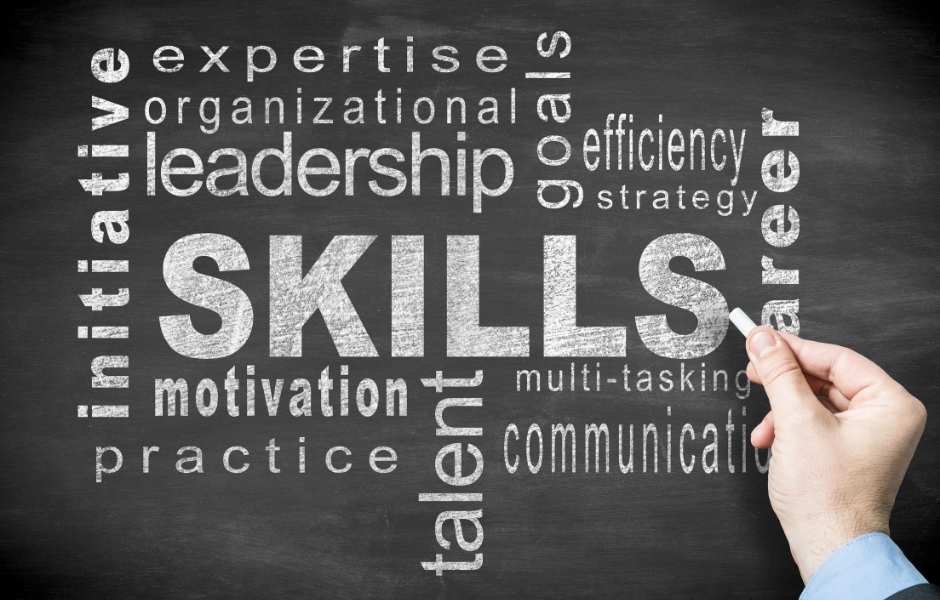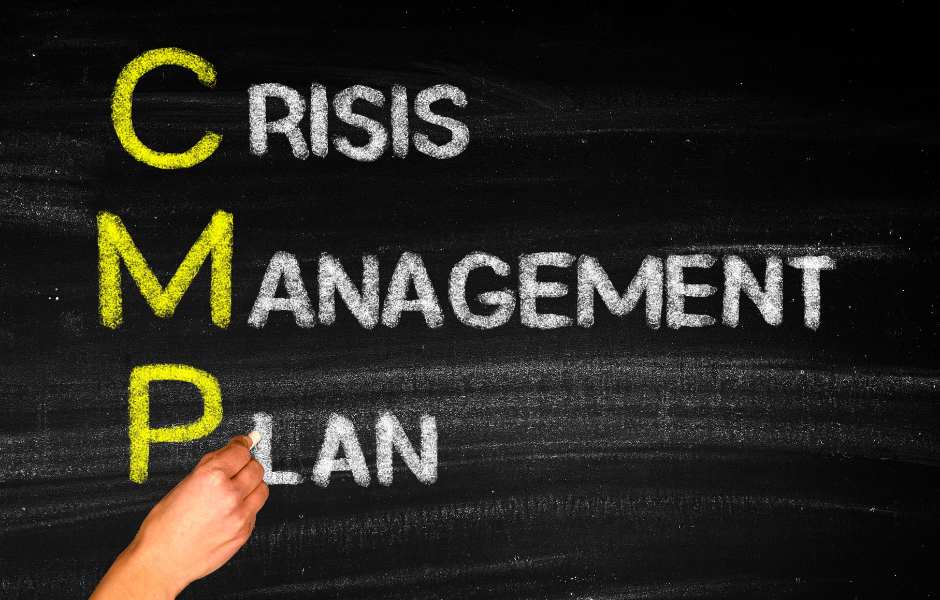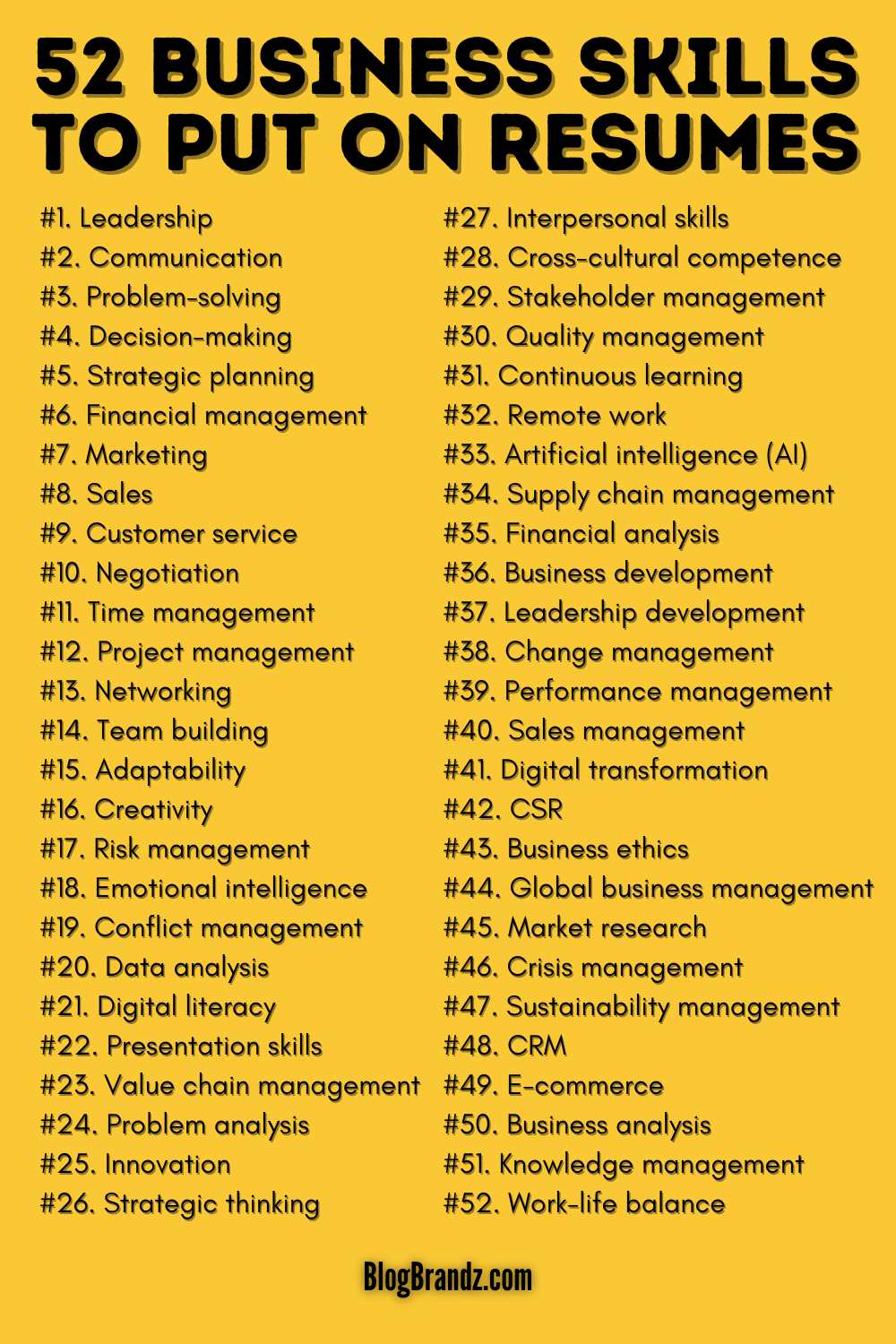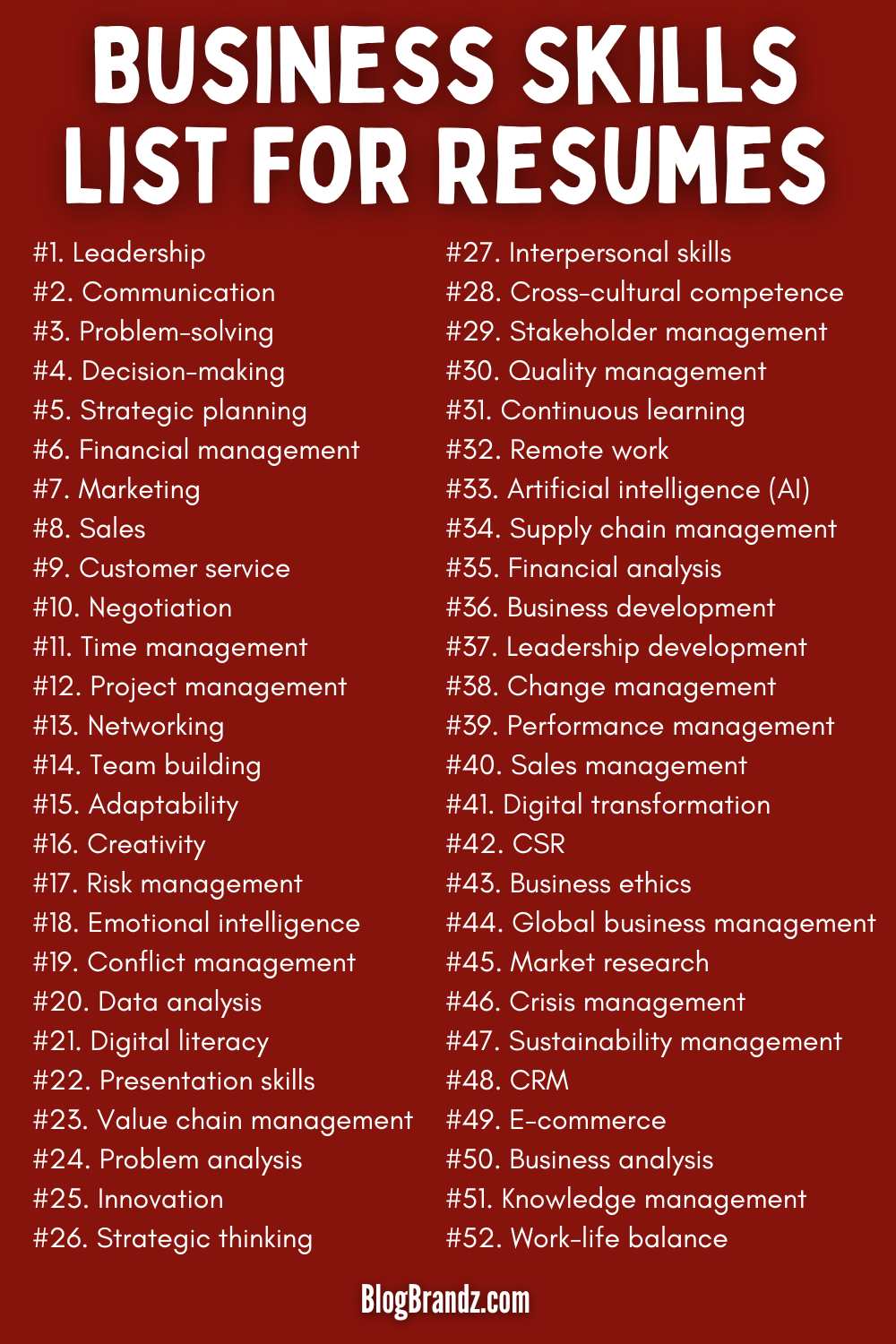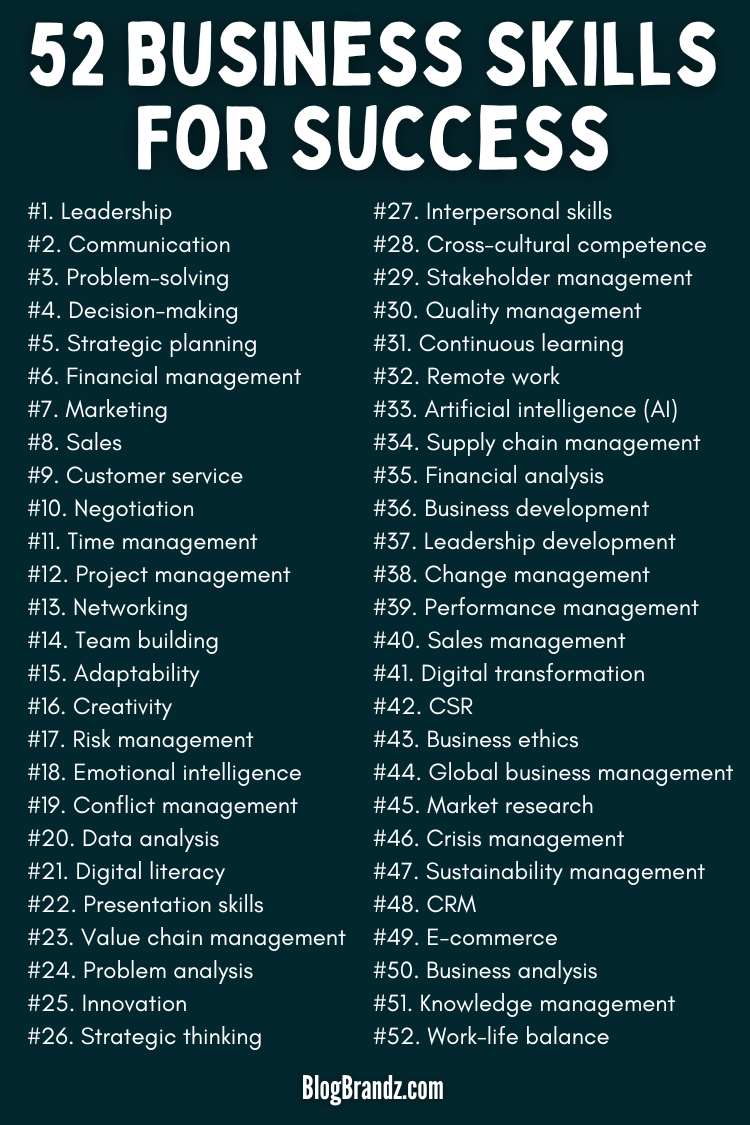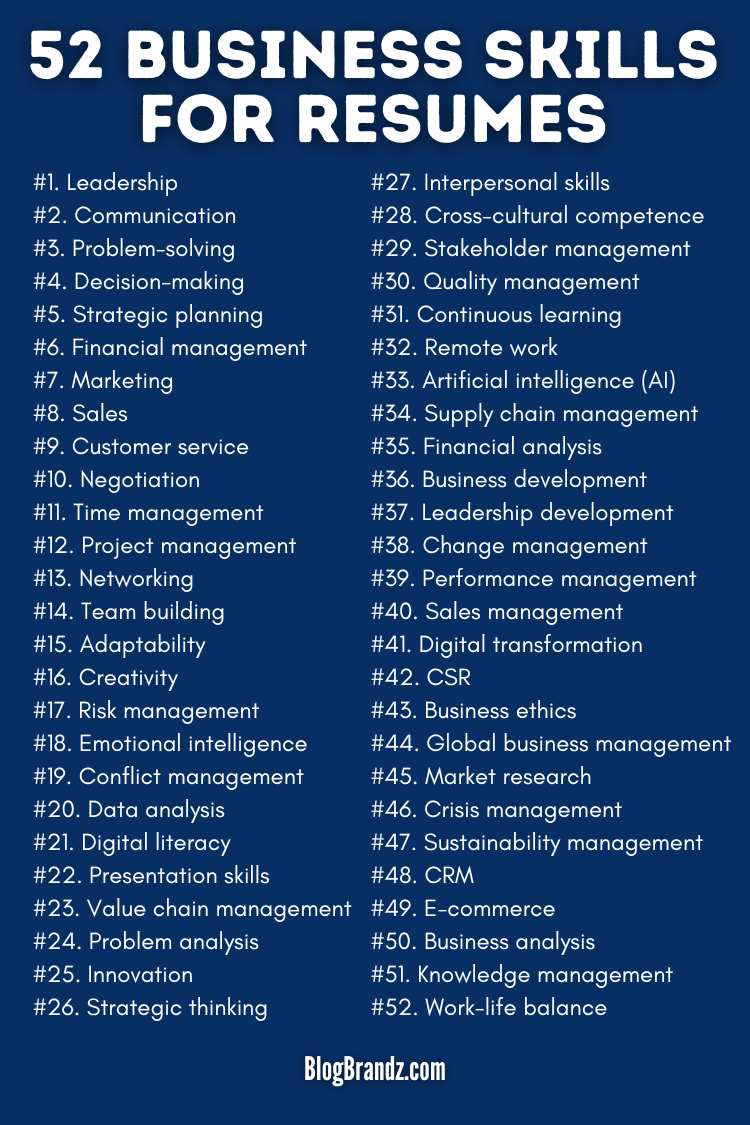Discover how to learn business skills for success with this comprehensive list of 52 business skills for aspiring leaders and entrepreneurs.
Are you looking to enhance your resume with strong business skills? But, what are business skills, how can they be critical for success, and how can you acquire and improve them?
Basic business skills encompass a wide range of abilities and competencies that are essential for success in the professional world.
These important business skills are crucial for individuals to effectively navigate the complexities of the business environment, drive organizational growth, and achieve their professional goals.
Contents
52 Business Skills for Success
Whether you’re an aspiring entrepreneur or leader, there are some essential business skills for success you should learn. In this list of business skills, you’ll see why each is important, and which business skills courses can help you succeed in any professional setting.
#1. Leadership skills
Leadership is essential for guiding teams by providing direction, inspiration, and support, ultimately driving organizational success.
Effective leaders empower their team members, foster a collaborative and innovative environment, and make strategic decisions that align with the organization’s goals and values.
Learning resources:
- Organizational Leadership Specialization from Northwestern University
- Critical Leadership Training with Navy SEAL Veteran, Jocko Willink
- Howard Schultz MasterClass on Business Leadership
- President Bill Clinton’s MasterClass on Inclusive Leadership
- Bob Iger MasterClass on Business Strategy & Leadership
- What are the Key Leadership Skills to Develop in Future Leaders?
- How To Build Inclusive Leadership & Diversity in Management
#2. Communication skills
Communication is about conveying ideas, instructions, and feedback, actively listening to others, understanding their perspectives, and fostering an environment of open dialogue.
Strong communication skills enable individuals to build strong relationships, resolve conflicts, and collaborate effectively, which is essential in a professional setting.
Learning resources:
- Effective Communication: Getting Your Ideas Across
- Improve Your English Communication Skills Specialization
- Assertive Communication Skills Masterclass
- Business Writing Courses to Write Clearly and Concisely
- 13 High-Stakes Communication Skills for Business Success
- George Stephanopoulos MasterClass on Purposeful Communication
- Robin Roberts MasterClass on Effective & Authentic Communication
#3. Problem-solving skills
Problem-solving is not just about identifying issues; it involves analyzing complex situations, thinking critically, and devising effective solutions.
Strong problem-solving skills enable individuals to approach challenges with confidence, creativity, and a systematic approach, leading to innovative and sustainable solutions that drive business success.
Learning resources:
- Effective Problem-Solving and Decision-Making
- Solving Complex Problems Specialization
- Solving Problems with Creative and Critical Thinking
- Computational Thinking for Problem Solving
- Dr. Cornel West MasterClass on Philosophy & Critical Thinking
#4. Decision-making skills
Decision-making is crucial for making sound and timely choices in the business world. It involves gathering relevant information, analyzing options, considering potential outcomes, and selecting the best course of action.
Strong decision-making skills enable individuals to make informed choices that align with organizational goals and drive positive outcomes.
Learning resources:
#5. Strategic planning
Strategic planning is essential for organizations to set long-term goals and define the path to achieve them. It involves analyzing the internal and external environment, identifying opportunities and threats, and developing strategies to leverage strengths and mitigate weaknesses.
Strong strategic planning skills enable organizations to adapt to changing circumstances, stay competitive, and achieve sustainable growth.
Learning resources:
#6. Financial management
Financial management is essential for ensuring the financial health and sustainability of a business.
It involves planning, organizing, directing, and controlling financial activities such as budgeting, forecasting, cash flow management, and financial reporting.
Strong financial management skills enable businesses to make informed financial decisions, allocate resources effectively, and achieve their financial goals.
Learning resources:
- Financial Management Specialization
- MasterClass on Crypto & The Blockchain
- Paul Krugman MasterClass on Economics and Society
- Mastering The Markets Series with Ray Dalio & Wall Street Titans
#7. Marketing skills
Strong marketing skills enable businesses to differentiate themselves from competitors, build brand awareness, and drive sales growth. Digital marketing skills are crucial for promoting products or services online and reaching a wider audience.
They involve using digital channels such as social media, email, and search engines to connect with customers and drive brand awareness and sales. Strong digital marketing skills enable businesses to target specific audiences, measure campaign effectiveness, and maximize ROI.
Learning resources:
- Viral Marketing Course
- How To Learn Digital Marketing
- How To Do Email Marketing
- The Complete Digital Marketing Course
- Google Digital Marketing Professional Certificate
- Jeff Goodby & Rich Silverstein’s Advertising & Creativity MasterClass
#8. Sales skills
Sales are crucial for any business as they directly contribute to revenue generation and overall business growth.
Sales skills involve understanding customer needs, building relationships, and persuasively communicating the value of products or services.
Strong sales skills enable individuals and organizations to effectively sell their offerings, meet sales targets, and drive profitability.
Learning resources:
#9. Customer service skills
Customer service is key for building and maintaining customer loyalty and satisfaction. It involves providing excellent support before, during, and after a purchase, addressing customer inquiries and concerns promptly and courteously.
Strong customer service skills enable businesses to create positive customer experiences, enhance brand reputation, and drive repeat business.
Learning resources:
- Customer Service Fundamentals
- Introduction to Customer Service from CVS Health
- CVS Health Call Center Customer Service Professional Certificate
- Customer Experience Management (CX) Masterclass
- Customer Experience Management (CXM) Guide
#10. Negotiation skills
Negotiation is essential for reaching mutually beneficial agreements in business. It involves effectively communicating and compromising to achieve outcomes that satisfy all parties involved.
Strong negotiation skills enable individuals to secure favorable deals, resolve conflicts, and build positive relationships with clients, suppliers, and other stakeholders.
Learning resources:
- Successful Negotiation: Essential Strategies and Skills
- How To Learn Powerful Negotiation Skills in the Workplace
- Chris Voss MasterClass on the Art of Negotiation
#11. Time management skills
Time management is important for prioritizing tasks, managing deadlines, and improving productivity. It involves setting goals, planning activities, and using time effectively to achieve objectives.
Strong time management skills enable individuals to work efficiently, reduce stress, and accomplish more in less time.
Learning resources:
- Time Management for Personal & Professional Productivity
- Personal Productivity, Time Management, and Prioritization
#12. Project management skills
Project management is crucial for overseeing projects and ensuring they are completed on time and within budget. It involves planning, organizing, and controlling resources to achieve specific goals.
Strong project management skills enable individuals to effectively manage tasks, allocate resources efficiently, and mitigate risks, leading to successful project completion.
Learning resources:
- Google Project Management: Professional Certificate
- Foundations of Project Management from Google
- IBM Project Manager Professional Certificate
- UCI Project Management Professional Certificate
- Project Management Specialization
#13. Networking skills
Networking is key for building professional relationships and creating business opportunities. It involves connecting with others in your industry, sharing knowledge, and establishing a support system.
Strong networking skills enable individuals to expand their professional network, access new opportunities, and advance their careers.
Learning resources:
- How to Network: Leading Yourself to Lead Others
- Professional Networking Tips for Local Networking Events
#14. Team building skills
Team building is essential for creating a cohesive and productive team and inspiring and guiding teams towards achieving goals. It involves setting a clear vision, motivating team members, and providing direction and support.
Team building skills are important for fostering a positive work environment, promoting collaboration, and encouraging open communication among team members.
Strong team-building skills enable leaders to build trust, motivate team members, foster a positive team culture, maximize team performance, and achieve collective success.
Learning resources:
- Teamwork and Creativity
- Leading Teams: Building Effective Team Cultures
- Culture-Driven Team Building Specialization
- Teamwork Skills: Communicating Effectively in Groups
- High-Performance Collaboration: Leadership, Teamwork, & Negotiation
- Teamwork Skills: Communicating Effectively in Groups
- Critical Leadership Training with Navy SEAL Veteran, Jocko Willink
- Geno Auriemma MasterClass on Leading Winning Teams
#15. Adaptability skills
Adaptability is important for responding to changes and challenges in the business environment. It involves being flexible, open-minded, and willing to adjust strategies and approaches as needed.
Strong adaptability skills enable individuals and organizations to thrive in dynamic and uncertain situations, navigate changes successfully, and seize new opportunities.
Learning resources:
- IBM’s People and Soft Skills for Professional & Personal Success Specialization
- Intellectual Humility: Science from The University of Edinburgh
- Professional Skills for the Workplace Specialization
#16. Creativity skills
Creativity is crucial for coming up with innovative ideas and solutions in business. It involves thinking outside the box, exploring new perspectives, and challenging conventional ways of thinking.
Strong creativity skills enable individuals and organizations to differentiate themselves, solve complex problems, and drive innovation and growth.
Learning resources:
- Disciplined Dreaming: Lead Breakthrough Creativity at Work
- Creativity, Design Thinking, and Innovation for Business
- The Art of Creative Thinking: How to Enhance Creativity
- Issa Rae MasterClass on Creating Outside the Lines
- Anna Wintour MasterClass on Creativity & Leadership
#17. Risk management skills
Risk management is key for identifying and mitigating potential risks to the business. It involves identifying, assessing, prioritizing risks, and implementing strategies to minimize their impact.
Strong risk management skills enable businesses to effectively anticipate and respond to potential threats, protect their assets, and maintain long-term sustainability.
Learning resources:
- Introduction to Risk Management
- Risk Management Specialization
- Investment Risk Management
- Portfolio and Risk Management
- Compliance and Risk Management
- Financial Engineering & Risk Management Specialization
#18. Emotional intelligence skills
Emotional intelligence is essential for understanding and managing emotions in oneself and others. It involves recognizing and regulating emotions, empathizing with others, and effectively handling interpersonal relationships.
Strong emotional intelligence skills enable individuals to navigate social complexities, communicate effectively, and build strong, collaborative relationships which is crucial in a professional setting.
Learning resources:
- Emotional Intelligence: Cultivating Immensely Human Interactions
- Managing Emotions in Times of Uncertainty & Stress
- Emotional Intelligence: Master Anxiety, Fear & Emotions
- Emotional & Social Intelligence from the University of California, Davis
- Empathy MasterClass with Pharrell Williams & Co-Instructors
#19. Conflict management skills
Conflict resolution is crucial for resolving conflicts constructively and fairly, and maintaining a harmonious work environment. It involves identifying sources of conflict, facilitating communication between parties, and finding mutually acceptable solutions.
Strong conflict management skills enable individuals to address conflicts early and constructively, prevent escalation, maintain positive relationships, build trust among team members, and foster a positive and productive work environment.
Learning resources:
- Conflict Management with Emotional Intelligence
- Non-violent Communication (NVC) Online Training Course
#20. Data analysis skills
Data analysis is crucial for making informed business decisions based on data insights. It involves collecting, organizing, and interpreting data to identify trends, patterns, and relationships.
Strong data analysis skills enable businesses to understand customer behavior, optimize operations, drive strategic decision-making, and improve performance and competitive advantage.
Learning resources:
- Google Data Analytics Professional Certificate
- Google Business Intelligence Professional Certificate
- IBM Data Analyst Professional Certificate
- IBM Data Science Professional Certificate
#21. Digital literacy skills
Digital literacy is key for leveraging digital tools and technologies in business operations. It involves understanding and using digital devices, applications, and platforms effectively.
Strong digital literacy skills enable individuals and organizations to adapt to technological advancements, enhance productivity, and stay competitive in today’s digital economy.
Learning resources:
#22. Presentation skills
Presentation skills are essential for delivering engaging and impactful presentations. They involve effectively communicating ideas, engaging with the audience, and delivering information clearly and concisely.
Strong presentation skills enable individuals to convey their message confidently, persuade and influence others, and achieve their communication goals effectively.
Learning resources:
- Finding Your Professional Voice: Confidence & Impact
- Verbal Communication and Presentation Skills
- Effective Business Presentations with PowerPoint
- Present with Purpose: Create/Deliver Effective Presentations
- Start Speaking With Confidence with the Best Public Speaking Coaches
- How To Overcome Speech Anxiety & Learn the Art of Public Speaking
#23. Value chain management skills
Value chain management is essential for optimizing each step in the production process to create maximum value for customers. It involves analyzing and improving activities from product development to delivery, ensuring efficiency and quality at every stage.
Strong value chain management skills enable businesses to reduce costs, enhance product quality, and respond swiftly to market demands. This leads to increased customer satisfaction, higher profitability, and a stronger competitive position in the market.
Learning resources:
#24. Problem analysis
Problem analysis is crucial for identifying the root causes of problems and finding effective solutions. It involves gathering and analyzing relevant information, identifying patterns and trends, and evaluating possible solutions.
Strong problem-analysis skills enable individuals to address underlying issues, make informed decisions, and implement solutions that prevent the recurrence of problems.
Learning resources:
- Analysis of Business Problems
- Business Problem-Solving Specialization
- Consulting Approach to Problem Solving
#25. Innovation skills
Innovation is key for driving business growth and staying ahead of competitors. It involves developing new ideas, products, or processes that create value for customers and differentiate the business in the marketplace.
Strong innovation skills enable businesses to adapt to changing market conditions, meet evolving customer needs, and capitalize on new opportunities, ultimately leading to sustainable growth and competitive advantage.
Learning resources:
- Rosalind Brewer MasterClass on Business Innovation
- Creativity, Design Thinking & Innovation for Business
- Disciplined Dreaming: Lead Breakthrough Creativity at Work
#26. Strategic thinking skills
Strategic thinking is essential for developing and executing effective business strategies. It involves analyzing complex situations, anticipating future trends, and developing innovative solutions to achieve organizational goals.
Strong strategic thinking skills enable individuals to make informed decisions, align resources with strategic objectives, and navigate the complexities of the business environment, ultimately leading to long-term success and competitive advantage.
Learning resources:
- Strategic Thinking for Everyone Specialization
- Building Strategic Foresight Capabilities
- Strategic Planning and Execution
#27. Interpersonal skills
Interpersonal skills are important for building rapport and fostering positive relationships with others. They involve effective communication, empathy, and the ability to relate to others on a personal level.
Strong interpersonal skills enable individuals to collaborate effectively, resolve conflicts, and build trust and respect among colleagues, clients, and stakeholders, ultimately leading to more productive and harmonious working relationships.
Learning resources:
- Professional Skills for the Workplace Specialization
- IBM’s People & Soft Skills for Professional & Personal Success Specialization
- Esther Perel MasterClass on Relational Intelligence
#28. Cross-cultural competence skills
Cross-cultural competence is crucial for working effectively in diverse and multicultural environments. It involves understanding different cultural norms, values, and communication styles, and adapting one’s behavior accordingly.
Strong cross-cultural competence enables individuals to navigate cultural differences, build relationships across cultures, and work collaboratively with colleagues and clients from diverse backgrounds, ultimately leading to more inclusive and successful outcomes.
Learning resources:
- Management of Multinational & Cross-Cultural Teams Specialization
- Intercultural Management from ESCP Business School
- Leading Diverse Teams from the University of California, Irvine
- Think Global: Teachers Training Course (IDP-ICE)
- International Leadership and Organizational Behavior
- President Bill Clinton’s MasterClass on Inclusive Leadership
#29. Stakeholder management skills
Stakeholder management is key for identifying and engaging with stakeholders to achieve business goals. It involves identifying key stakeholders, understanding their needs and expectations, and effectively communicating with them throughout the project or initiative.
Strong stakeholder management skills enable individuals to build trust, gain support, and align interests, ultimately leading to successful project outcomes and stakeholder satisfaction.
Learning resources:
#30. Quality management skills
Quality management is essential for ensuring products or services meet or exceed customer expectations. It involves establishing quality standards, monitoring processes, and continuously improving operations to enhance quality.
Strong quality management skills enable businesses to deliver high-quality products or services, build customer trust and loyalty, and maintain a competitive edge in the market.
Learning resources:
#31. Continuous learning skills
Continuous learning is important for staying updated with industry trends and acquiring new skills. It involves actively seeking out new knowledge, attending training programs, and engaging in professional development activities.
Strong continuous learning skills enable individuals to adapt to changes in the business environment, stay competitive in their field, and achieve personal and professional growth.
Learning resources:
#32. Remote work skills
Remote work skills are crucial for effectively collaborating and maintaining productivity in a virtual environment. These skills include time management, communication, and the ability to use digital tools and platforms efficiently.
Strong remote work skills enable individuals to stay organized, meet deadlines, and contribute to team goals despite physical distance. They also foster a sense of connection and teamwork, ensuring that business operations run smoothly even when employees are not co-located.
Learning resources:
- How to Rock Remote Work
- Remote Work: How To Work from Home Productively
- Working Remotely: How To Succeed in the New Workplace
- Remote Work Best Practices for Freelancers & Independent Contractors
#33. Artificial intelligence (AI) skills
AI skills are becoming increasingly important for businesses to stay competitive and drive innovation. They involve understanding and implementing artificial intelligence technologies to automate processes, gain insights from data, and improve decision-making.
Strong AI skills enable businesses to enhance customer experiences, optimize operations, and unlock new growth opportunities. Having AI skills can help businesses leverage AI technologies effectively, drive innovation, and stay ahead in today’s digital age.
Learning resources:
- Google AI Essentials
- IBM AI Engineering Professional Certificate
- Introduction to Generative AI from Google Cloud
- AI Foundations for Everyone Specialization from IBM
- Business Implications of AI: A Nano-course from EIT Digital
- AI For Business Specialization from the University of Pennsylvania
- Prompt Engineering for ChatGPT from Vanderbilt University
#34. Supply chain management skills
Supply chain management is essential for ensuring the efficient flow of goods and services, involving planning, sourcing, producing, and delivering products while managing inventory levels and costs.
Strong skills in supply chain management and optimization enable businesses to streamline workflows, reduce lead times and costs, and meet customer demands effectively. This leads to improved operational efficiency, customer satisfaction, profitability, and competitive advantage.
Learning resources:
- Supply Chain Management Specialization
- Supply Chain Excellence Specialization
- Supply Chain Principles by Georgia Institute of Technology
- Data Science for a More Agile Supply Chain Specialization
#35. Financial analysis skills
Financial analysis is important for assessing the financial health of a business and making informed decisions. It involves analyzing financial statements, performance metrics, and market trends to evaluate the financial performance and viability of a business.
Strong financial analysis skills enable individuals to identify strengths and weaknesses, forecast future performance, and make strategic recommendations that drive business growth and profitability.
Learning resources:
- Financial Analysis Skills for Success Specialization
- Introduction to Finance & Accounting Specialization
- Financial Statement Analysis by Intuit
#36. Business development skills
Business development is crucial for identifying new business opportunities and driving growth. It involves building relationships with potential clients, identifying market trends, and developing strategies to expand the business.
Strong business development skills enable individuals to identify new markets, negotiate deals, and drive revenue growth, ultimately contributing to the overall success of the organization.
Learning resources:
- Relationship Management & Business Development
- Successful Negotiation: Essential Strategies and Skills
- Chris Voss MasterClass on the Art of Negotiation
#37. Leadership development skills
Leadership development skills are key for nurturing future leaders within the organization.
It involves identifying and developing individuals with leadership potential, providing them with opportunities for growth and development, and equipping them with the skills and knowledge needed to lead effectively.
Strong leadership development programs enable organizations to build a pipeline of talented leaders, ensure continuity in leadership roles, and drive long-term success.
Learning resources:
- Connected Leadership by Yale University
- Leadership for the Future Specialization
- Leadership in 21st-Century Organizations
- How To Become a Chief Training Officer (CTO)
- How to Be a Great Mentor & Sponsor in The Workplace
- Coach K MasterClass on Values-Driven Leadership
#38. Change management skills
Change management is essential for managing and adapting to organizational change. It involves planning, implementing, and communicating changes effectively to minimize resistance and maximize engagement.
Strong change management skills enable organizations to navigate transitions smoothly, maintain employee morale and productivity, and achieve desired outcomes.
Learning resources:
- Removing Barriers to Change by the University of Pennsylvania
- Influencing: Storytelling, Change Management & Governance Specialization
- Strategic Leadership: Impact, Change & Decision-Making Specialization
- Change Leadership: Developing Strategic Gap Analysis in Miro
- Leading Organizational Change by University System of Georgia
#39. Performance management skills
Performance management is important for setting and tracking performance goals. It involves defining clear objectives, providing regular feedback, and evaluating progress towards goals.
Strong performance management skills enable managers to identify strengths and areas for improvement, motivate employees, and enhance overall performance and productivity.
Learning resources:
- Employee Relations by HRCI
- Managing Employee Performance by the University of Minnesota
- Leading People & Teams Specialization by the University of Michigan
- Human Resource Management: HR for People Managers Specialization
#40. Sales management skills
Sales management is crucial for overseeing sales teams and achieving sales targets. It involves setting sales goals, developing sales strategies, and managing sales processes to drive revenue growth.
Strong sales management skills enable managers to motivate and coach sales teams, identify opportunities for improvement, and ensure the achievement of sales targets and objectives.
Learning resources:
- Strategic Sales Management Specialization
- Sales Operations/Management Specialization
- Salesforce Sales Operations Professional Certificate
#41. Digital transformation skills
Digital transformation is key for integrating digital technologies into all areas of a business. It involves reimagining business processes, operations, and customer experiences to leverage the capabilities of digital technologies.
Strong digital transformation skills enable organizations to stay competitive, improve efficiency, and meet the evolving needs of customers in the digital age.
Learning resources:
- Leading the Modern Day Business Specialization
- Introduction to Digital Transformation by Siemens
- Advanced Digital Transformation Specialization
#42. Corporate social responsibility (CSR)
Corporate social responsibility (CSR) is essential for demonstrating a commitment to social and environmental issues. It involves integrating social and environmental concerns into business operations and interactions with stakeholders.
Strong CSR practices enable businesses to build trust, enhance reputation, and create long-term sustainable value for society and the environment.
Learning resources:
- The 360º Corporation: Tools for Achieving Corporate Purpose
- Corporate Sustainability: Understanding & Seizing the Strategic Opportunity
- How To Become a Corporate Social Responsibility (CSR) Manager
#43. Business ethics
Business ethics are important for maintaining trust and integrity in business dealings. They involve adhering to moral principles and values in decision-making and actions.
Strong business ethics enable businesses to build a positive reputation, attract and retain customers and employees, and contribute to a more ethical and sustainable business environment.
Learning resources:
- Ethical Leadership Specialization from The University of Notre Dame
- Ethical Leadership Through Giving Voice to Values
- Artificial Intelligence: Ethics & Societal Challenges
- AI for Good Specialization from DeepLearning.AI
- AI, Empathy & Ethics from the University of California, Santa Cruz
- Ethical Decision-Making in the Tech Industry Specialization
- Data Science Ethics from the University of Michigan
- Indra Nooyi MasterClass on Leading with Purpose
#44. Global business management
Global business management is crucial for understanding and navigating the complexities of global markets. It involves developing strategies and practices that enable businesses to operate effectively in different countries and cultures.
Strong global business management skills enable organizations to expand internationally, manage cross-cultural teams, and capitalize on global opportunities, ultimately leading to increased competitiveness and success in the global marketplace.
Learning resources:
- Global Challenges in Business Specialization
- International Business II by the University of New Mexico
- Management of Multinational & Cross-Cultural Teams Specialization
#45. Market research skills
Market research is key for gathering insights into customer needs and preferences. It involves collecting and analyzing data about market trends, customer behavior, and competitors.
Strong market research skills enable businesses to identify new opportunities, develop targeted marketing strategies, and make informed business decisions that meet the needs of their customers, ultimately leading to increased competitiveness and profitability.
Learning resources:
#46. Crisis management skills
Crisis management is essential for responding to and recovering from crises effectively. It involves planning, coordinating, and executing strategies to mitigate the impact of crises on an organization.
Strong crisis management skills enable businesses to respond promptly, communicate effectively, and restore operations quickly, ultimately minimizing damage and maintaining trust and confidence among stakeholders.
Learning resources:
- Crisis Day Series on MasterClass
- High Stakes Leadership: Leading in Times of Crisis
- Leadership for Public Health Crises Specialization
- Resilience & Leadership: Tools, Methods, & Applications
- Crisis Management: Ensuring Business Continuity in Uncertain Times
#47. Sustainability management skills
Sustainability management is crucial for integrating sustainable practices into business operations. It involves assessing and minimizing environmental impacts, promoting social responsibility, and ensuring economic viability.
Strong sustainability management skills enable businesses to reduce waste, conserve resources, and enhance their reputation as responsible corporate citizens, ultimately leading to long-term business success and environmental stewardship.
Learning resources:
- Introduction to Sustainability (University of Illinois at Urbana-Champaign)
- Strategy and Sustainability (IESE Business School)
- Corporate Sustainability: Understanding & Seizing the Strategic Opportunity
- Driving Business Towards the Sustainable Development Goals
- Impact Measurement & Management for the SDGs
- How To Become a Corporate Social Responsibility (CSR) Manager
#48. Customer relationship management (CRM)
Customer relationship management (CRM) is key for managing and nurturing customer relationships. It involves using technology to organize, automate, and synchronize sales, marketing, customer service, and technical support.
Strong CRM skills enable businesses to better understand their customers, improve customer retention, and drive sales growth by delivering personalized experiences and targeted communications.
Learning resources:
- Customer Relationship Management
- Customer Experience Management (CX) Masterclass
- Customer Experience Management & Customer Journey Mapping
- Customer Experience Management (CXM): Craft an Unforgettable Customer Journey
#49. E-commerce skills
E-commerce is essential for leveraging online platforms to sell products or services. It involves conducting business transactions electronically, typically over the Internet.
Strong e-commerce skills enable businesses to reach a wider audience, reduce overhead costs, and provide convenient shopping experiences for customers, ultimately leading to increased sales and business growth.
Learning resources:
- Google Digital Marketing & E-commerce Professional Certificate
- WordPress Ecommerce: Using WooCommerce To Build Online Stores
- Free Ecommerce Guides & Online Ecommerce Courses
#50. Business analysis skills
Business analysis is important for identifying business needs and recommending solutions. It involves analyzing processes, gathering requirements, and proposing improvements to help organizations achieve their goals.
Strong business analysis skills enable individuals to bridge the gap between business stakeholders and technical teams, ensuring that solutions meet business objectives and deliver value.
Learning resources:
- Fundamentals of Business Analysis
- Certified Business Analysis Professional™ (CBAP®) Specialization
- Microsoft Business Analyst Professional Certificate
- Business Analysis & Process Management
#51. Knowledge management skills
Knowledge management is crucial for capturing, sharing, and leveraging organizational knowledge. It involves creating processes and systems to acquire, store, and distribute knowledge within an organization.
Strong knowledge management skills enable businesses to improve decision-making, foster innovation, and enhance overall organizational performance.
Learning resources:
- Knowledge Management Masterclass
- Knowledge Insights & Best Practice
- Building Efficient & Sustainable Knowledge Management System
#52. Work-life balance skills
Work-life balance is essential for maintaining a healthy equilibrium between professional responsibilities and personal well-being.
It involves creating a harmonious blend of work and personal activities, allowing individuals to fulfill their career goals while also attending to personal needs and family commitments.
Strong work-life integration skills enable individuals to manage stress, prevent burnout, and maintain overall life satisfaction. This balance ultimately leads to increased productivity, better job satisfaction, and improved mental and physical health.
Learning resources:
- Work-Life Balance, Time & Burnout Management
- Achieving Better Work & Life Balance for Business People
- Work-Life Balance + Well-Being for Hybrid & Remote Workers
- Work-Life Balance: Time Management Masterclass Course
- Robin Arzón MasterClass on Mental Strength
- Jon Kabat-Zinn MasterClass on Mindfulness & Meditation
Which Business Skills Should I Learn?
While the skills above are valuable in various business contexts, not all are essential for everyone. For example, while digital marketing skills are crucial for a marketing manager, they may be less relevant for a financial analyst.
In the list of business skills above, some are essential business skills, such as emotional intelligence and communication skills, while others such as sales and marketing are good business skills, though not critical for everyone.
It’s also important to recognize that each individual has unique strengths and weaknesses, and not all business skills training will be equally beneficial or enjoyable for everyone.
These free career quizzes will help you identify which business skills to put on your resume based on your career interests and job preference.
If you enjoy analyzing data and trends, you may find that skills like data analysis or financial management are more fulfilling. Someone who excels in interpersonal relationships may prefer focusing on customer service or team leadership skills.
By understanding your personality type and preferences, you can make more informed decisions about which business skills courses to choose ultimately leading to a more fulfilling and successful career.
With a Coursera Plus subscription, you get unlimited access to 7,000+ world-class courses, hands-on projects, job-ready Specializations, and Professional Certificates taught by top instructors from leading universities and company programs.
Upskilling & Reskilling Tips
- 15 Most In-Demand Freelance Skills to Learn
- Best Skills To Earn Money From Internet Business Ventures
- Unlock Your Potential with Top-Rated Coursera Courses
- Best Business Courses To Learn Entrepreneur Skills
- 18 Types Of Writing Skills and How To Learn Them
© 2024, Priya Florence Shah. All rights reserved.
Priya Florence Shah is a bestselling author and an award-winning blogger. Check out her book on emotional self-care for women. Priya writes short stories and poetry and chills with her two-legged and four-legged kids in her spare time.
Discover more from Business & Branding Tips
Subscribe to get the latest posts sent to your email.
